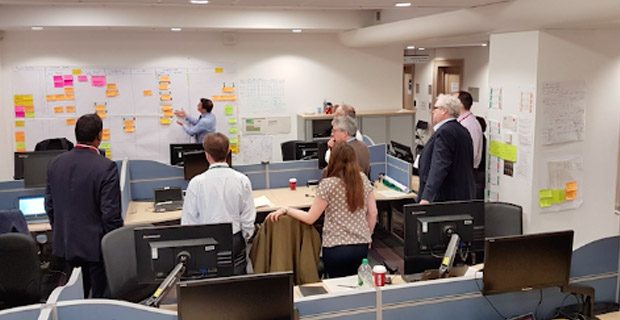Defra is undergoing transformation. Defra has lots of data. And data is key to delivering ‘the transformation we want’.We've previously shown how we're improving the value of our data but data alone can’t deliver the improved outcomes we seek. For that, we need to work differently too.
The Data Programme has been running a set of demonstration projects known as 'Proofs of Concepts' or 'PoCs' to begin to explore how we can make better use of the data. Within these we knew roughly but not exactly was needed. Agile is a way of working that allows a lot of flexibility in how the thing you’re building is delivered. A key element is regular interaction with users. This can work well where the requirement is not 100% understood and this approach was used throughout the PoCs.
Defra does not appear to have used this sort of process much before. The existing pattern has been more one of: ‘this is what we want; how much will it cost? …ok (if it's within our budget): go and build it.’
Outsourcing generally minimises risk around lack of delivery to the individual and their direct chain of command. To the wider organisation, there is potentially a greater risk of having to accept work that doesn’t quite match what you want (perhaps because it was difficult to articulate, or because it was very complex – which can lead to ‘omissioning’ during commissioning) or because multiple outsourced projects rarely fit together in a satisfying way.
The first observation was that commercial teams were initially uncomfortable with this sort of approach. They were used to contracts with the big providers that were very prescriptive, rather than just buying in capacity. Even once the commercial team was reassured, some contractors were still nervous – probably reflecting their previous experience of being blamed for not delivering. So the first lesson was trying to make sure the risk was owned by the product owner and delivery manager. It was ok to make mistakes – as long as we learned and learned quickly.

The next issue was finding space to work. The teams could be up to about twelve people and would necessarily create a bit of disruption. Critically, we needed walls and whiteboards. While it would have been nice to also locate these within Defra – there simply is not the space for the multiple proofs-of-concept we’ve been spinning up. We ended up running one within Nobel House using one of the hotdesking areas. This worked well but caused some disruption but later, the Facilities team found office space that was not being used. This colocation is really key and is something that we are going to have to think about – particularly as Defra moves to smaller London offices.
There was pressure on us to plan the work to a level that would have constituted overplanning. Again, as Defra is so used to working in a more tightly defined way, the expectation is that we know exactly what we were doing and when it would complete. In the case of each of the PoCs, we knew where we were going and had roughly divided the work into one week ‘sprints’. But in some of them the detail changed almost daily – new workstreams were spawned as problems or risks encountered, others dropped as they didn’t work or weren’t needed. Through all of these there was a sharp focus on a making sure that the outcomes were still on track.
A really key aspect is being able to make decisions quickly. The project almost failed before it started as a result of problems getting permissions to lift the data we needed into the Amazon Cloud. An organisation like Defra has got used to delaying decisions until there is absolute clarity or certainty and this is a real blocker to rapid progress.
One of the biggest wins was gaining better support from the business itself. People were able to see tangible progress which built confidence as did being able to directly influence the direction. This tight integration between Digital and the business will be fundamental to the success of the broader Digital Transformation programme.
